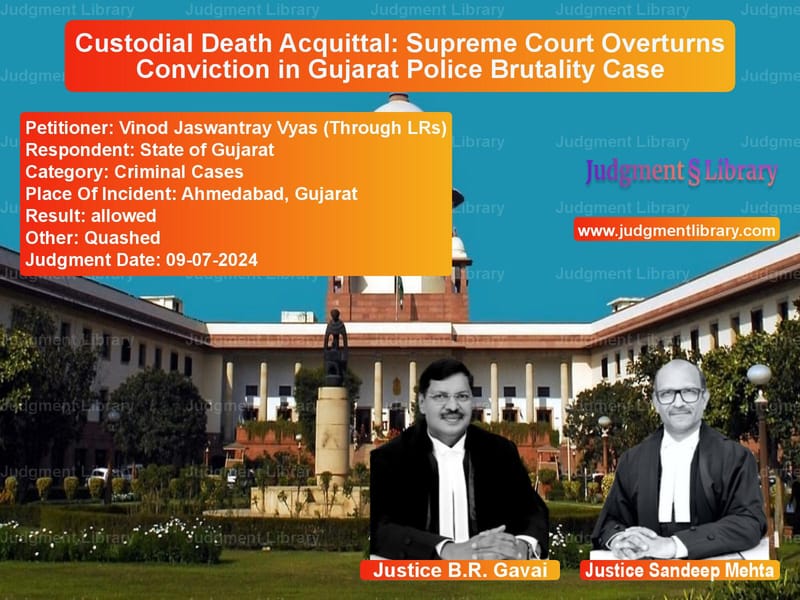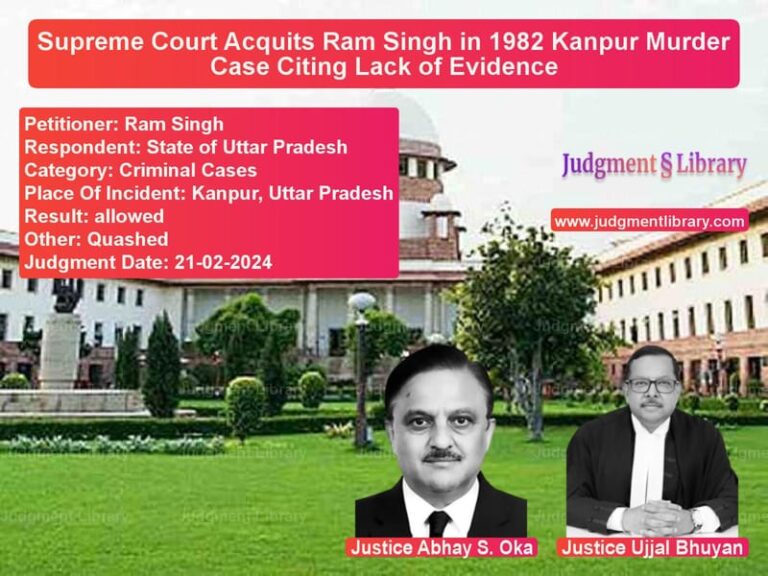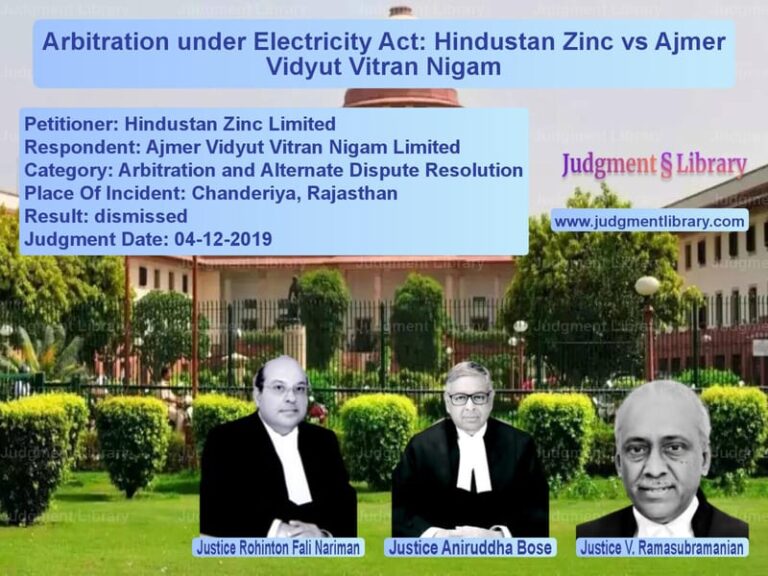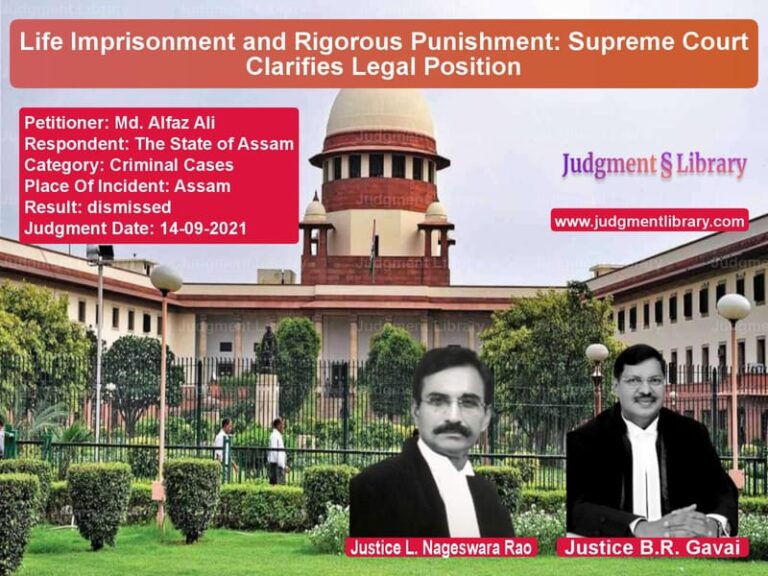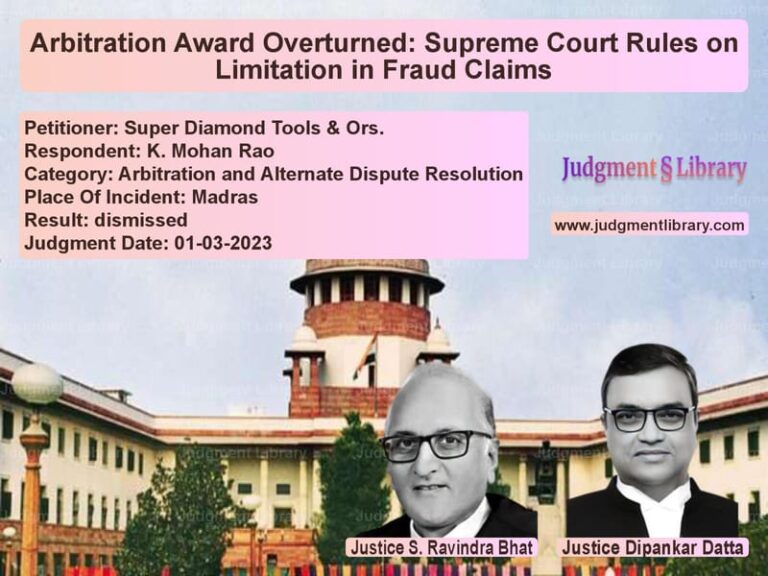Custodial Death Acquittal: Supreme Court Overturns Conviction in Gujarat Police Brutality Case
The Supreme Court of India has delivered a crucial ruling in the case of Vinod Jaswantray Vyas v. The State of Gujarat, overturning the conviction of a police officer accused of custodial violence leading to the death of an accused. The case revolved around allegations of severe police brutality at Amraiwadi Police Station, Ahmedabad, which allegedly resulted in the death of a man in judicial custody. The ruling clarifies the burden of proof in custodial violence cases and reinforces the role of medical evidence in assessing allegations of custodial deaths.
Background of the Case
The case originated from the custodial death of Jeeva, who was accused in a criminal case and surrendered at Amraiwadi Police Station on June 10, 1992, in the presence of his advocate and family members. The prosecution alleged that Jeeva was subjected to brutal physical assault by the accused police officers, resulting in his death while in judicial custody on June 12, 1992.
The Trial Court convicted the accused, sentencing them to life imprisonment under Section 302 of the Indian Penal Code (IPC). However, the Gujarat High Court modified the conviction to Section 304 Part I IPC, reducing the sentence to eight years of rigorous imprisonment, along with a fine of Rs. 50,000. The case was subsequently brought before the Supreme Court.
Key Legal Issues Before the Supreme Court
- Whether the prosecution had successfully established custodial torture as the cause of death.
- Whether the accused police officers could be held responsible for custodial death based on circumstantial evidence and eyewitness testimony.
- Whether medical evidence corroborated the prosecution’s case.
- Whether there was procedural irregularity in the filing of the complaint.
Petitioner’s Arguments
The counsel for the petitioner, Vinod Jaswantray Vyas, made the following arguments:
- The delay in filing the complaint (20 days after the incident) casts serious doubt on the credibility of the prosecution’s case.
- The accused police officers had no motive to assault the victim, as he had voluntarily surrendered.
- The medical evidence did not conclusively establish that the injuries sustained by the victim were inflicted in police custody.
- The deceased was in judicial custody before his death, and it is plausible that the injuries occurred while he was lodged in Sabarmati Central Jail.
- The key eyewitnesses, including the victim’s sister, were unreliable as they did not report the alleged torture immediately.
Respondent’s Arguments
The State of Gujarat, representing the prosecution, countered the defense with the following arguments:
- There were multiple eyewitnesses, including the victim’s sisters and a co-detainee, who confirmed that Jeeva was brutally beaten in police custody.
- The post-mortem report recorded multiple injuries, including fractures of the ribs, sternum, and internal organ damage, indicating severe beating.
- There was an apparent attempt to suppress the incident, as the police did not take action on the telegram sent by the victim’s sister reporting the torture.
- The accused had the power and opportunity to commit the crime, and their defense of alternative injury sources was unconvincing.
Supreme Court’s Observations
The Supreme Court thoroughly examined the evidence and issued several key observations:
1. The Importance of Medical Evidence
The court noted that medical reports play a critical role in determining the timing and cause of injuries. The post-mortem report indicated that the injuries were fresh and likely occurred within six to eight hours before death. However, the medical examiner stated that a person with such severe injuries would not have been able to climb stairs or function normally.
2. Discrepancies in Eyewitness Testimonies
The court observed inconsistencies in the testimonies of the prosecution witnesses. The victim’s sister, who claimed to have witnessed the torture, did not report the incident to the magistrate when the victim was produced in court. Additionally, the co-detainee did not provide a consistent statement regarding the sequence of events.
3. Delay in Filing the Complaint
The court considered the 20-day delay in lodging the formal complaint, which raised questions about the credibility of the accusations. The defense argued that the delay was used to fabricate allegations against the accused.
4. Alternative Possibility of Injuries
The court found merit in the defense’s argument that the injuries could have occurred in judicial custody rather than at the police station. The presence of red soil on the victim’s clothes, which matched the soil found in Sabarmati Central Jail, supported this alternative theory.
Final Judgment
After weighing all aspects of the case, the Supreme Court ruled:
- The prosecution failed to establish beyond reasonable doubt that the accused were responsible for the victim’s injuries.
- The medical evidence did not conclusively link the accused to the custodial torture.
- Eyewitness accounts were unreliable due to inconsistencies and procedural delays.
- The appeal was allowed, and the conviction of the accused was overturned.
Implications of the Judgment
This ruling sets an important precedent for custodial death cases, emphasizing the need for strong medical and corroborative evidence. While acknowledging the seriousness of custodial torture, the court reinforced the principle that convictions must be based on irrefutable proof rather than suspicion.
By overturning the High Court’s judgment, the Supreme Court has reiterated the necessity of procedural fairness and the importance of concrete evidence in criminal cases involving law enforcement officers.
Petitioner Name: Vinod Jaswantray Vyas (Through LRs).Respondent Name: State of Gujarat.Judgment By: Justice B.R. Gavai, Justice Sandeep Mehta.Place Of Incident: Ahmedabad, Gujarat.Judgment Date: 09-07-2024.
Don’t miss out on the full details! Download the complete judgment in PDF format below and gain valuable insights instantly!
Download Judgment: vinod-jaswantray-vya-vs-state-of-gujarat-supreme-court-of-india-judgment-dated-09-07-2024.pdf
Directly Download Judgment: Directly download this Judgment
See all petitions in Custodial Deaths and Police Misconduct
See all petitions in Attempt to Murder Cases
See all petitions in Fraud and Forgery
See all petitions in Bail and Anticipatory Bail
See all petitions in Judgment by B R Gavai
See all petitions in Judgment by Sandeep Mehta
See all petitions in allowed
See all petitions in Quashed
See all petitions in supreme court of India judgments July 2024
See all petitions in 2024 judgments
See all posts in Criminal Cases Category
See all allowed petitions in Criminal Cases Category
See all Dismissed petitions in Criminal Cases Category
See all partially allowed petitions in Criminal Cases Category

